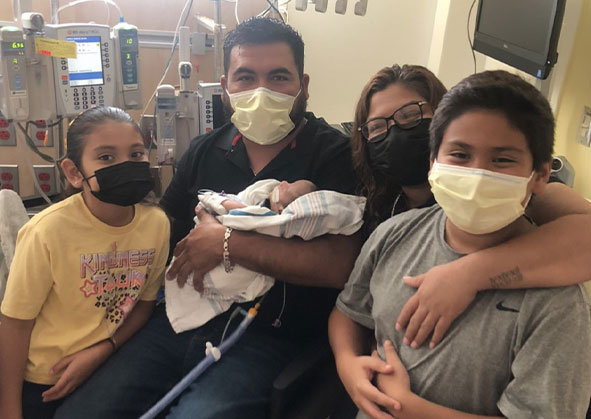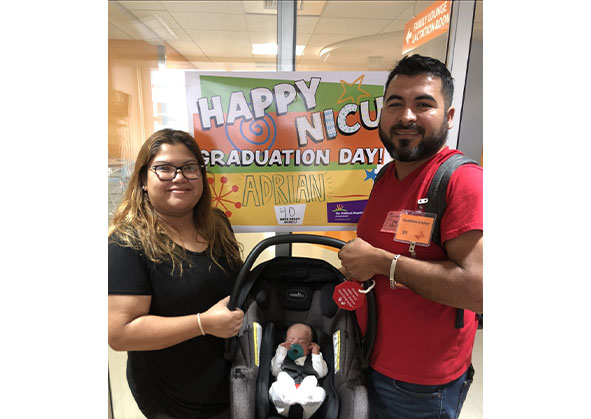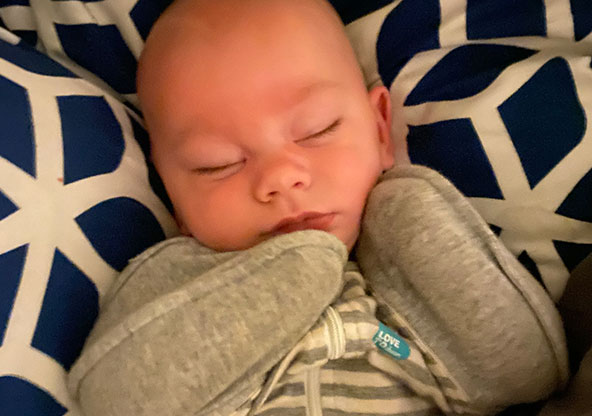 Already parents to a 10-year-old son and two daughters, 8 and 6 years old, Cinthia and her fiancé, Adrian, wanted to have a baby. They wanted their kids to have another sibling to complete their family.
Already parents to a 10-year-old son and two daughters, 8 and 6 years old, Cinthia and her fiancé, Adrian, wanted to have a baby. They wanted their kids to have another sibling to complete their family.
Shortly after stopping birth control, Cinthia was pregnant. She and her fiancé were over the moon.
Since Cinthia had a previous history of pre-eclampsia, a potentially dangerous pregnancy complication characterized by high blood pressure, her OB-GYN sent her to a maternal fetal medicine specialist.
“My first visit with my MFM didn’t go very well,” said Cinthia. “At 24-weeks, my sugar levels were high. I had to take insulin to control my blood sugar. My blood pressure was fine, but my doctor wanted me to monitor my blood pressure regularly. During that visit, I found out our son had a single umbilical artery in his umbilical cord.”
An umbilical cord contains two arteries and one vein. The vein carries oxygen and nutrients to the baby in the womb, and the arteries remove waste products. Single umbilical artery is when one artery in the umbilical cord is missing. It happens in about 1 in 100 singleton pregnancies (1 percent) and about 5 in 100 multiple pregnancies (5 percent). A single umbilical artery is usually sufficient to maintain a healthy pregnancy, but sometimes it can slow down the baby’s growth and injure other organs.
Cinthia was referred to a fetal cardiologist to check on her baby’s heart. The echocardiograms showed her baby’s heart was perfect and developing normally. Everything seemed to be smooth sailing.
“When I was 33 weeks pregnant, I began having pain and my blood pressure was extremely elevated,” said Cinthia. “My BP was over 200 and they could not get it down. So, I needed an emergency C-section.”
Cinthia and Adrian welcomed their newborn son, Adrian, on August 10, 2022, at a San Antonio hospital. They were happy and excited to meet their newborn baby.
“Our son was small and weighed three pounds,” said Cinthia. “After Adrian was born, he was taken to the NICU and put on oxygen right away. He did well and then he began breathing unusually fast. His tummy would go up and down super fast. He could not bottle feed because of his breathing. It took a lot of effort for him to eat, and his nurses didn’t want him to overdo it. So, he was fed through a NG tube."

 Already parents to a 10-year-old son and two daughters, 8 and 6 years old, Cinthia and her fiancé, Adrian, wanted to have a baby. They wanted their kids to have another sibling to complete their family.
Already parents to a 10-year-old son and two daughters, 8 and 6 years old, Cinthia and her fiancé, Adrian, wanted to have a baby. They wanted their kids to have another sibling to complete their family. Two unexpected diagnoses
Two unexpected diagnoses Adrian’s PDA surgery
Adrian’s PDA surgery
